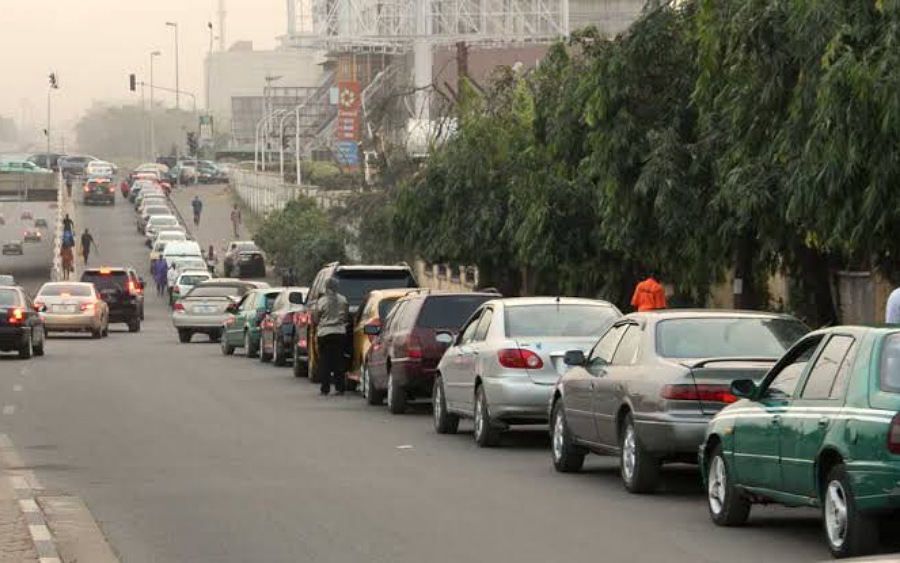It is no longer news that fuel scarcity continues to loom across some parts of the country. Long queues at fuel stations have become a common sight. Vehicle owners are spending a ridiculous number of hours waiting for a chance to fill up their tanks.
In some cities like the Federal Capital Territory, Abuja, these long queues of cars trying to buy fuel often spill into the road, thereby causing avoidable traffic jams.
How the fuel scarcity affects small businesses in Abuja
One of the most visible effects of this ongoing fuel scarcity is the increase in food prices in the market. Traders spend more nowadays to convey their products to the final consumers. To make up for the exorbitant cost of transportation, they need to raise the prices of their goods to make up for the transportation cost. This has caused general hardship for most consumers, whose incomes have however, remained the same.
The direct effect of this situation is the soaring hike in the cost of transportation. Commercial transportation has increased significantly in Abuja and people now have to pay more for commuting the same distance as before. This increased cost of transportation has also triggered a hike in prices of goods and services across the board.
Businesses that run on constant power are also affected by the hike in fuel price, especially those that have to fuel their generators to keep their business going which has led to the increase in the amount charged for goods and services.
In Abuja, the situation becomes more biting in the face of the poor electricity supply also resulting in business owners losing precious time sitting idly at fuel stations waiting for their turn to buy the scarce commodity. In the face of all this, they lose precious business hours and also lose customers who are deterred by the hike in prices.
Businesses that have to run on power now burn the scarce and expensive fuel to run their operations, thereby causing them to increase the price of their goods and services in order for their businesses to stay afloat.
Business owners lament…
Rashidat Salihu, owner of Rash Stitches while speaking with Nairametrics on the impact of the fuel scarcity on her business said; “The experience has been a difficult one. I can’t get fuel as a business owner because fuel stations have refused to sell for us in jerrican.
“I have not been able to meet up with people’s orders since there has not been constant light and my business is going slow. It is really affecting my business as a fashion designer.
She said the lack of fuel has resulted in an increase in the prices of materials which has translated to her increasing the amount she charges per cloth. “Yes, the fuel scarcity has affected the cost of material and I have no choice but to increase the charges too.”
Mrs Anna Nwoaha, the Creative Director of Penky’s Confectionery and Snackbox Abuja said this about the impact of fuel scarcity on her business.
“The fuel scarcity experience has been nothing but a sad one, to say the least! Some days, there is no fuel and we are compelled to buy the black market at a higher cost and even at that, some fuel hawkers mix thiers… we had an incident with a bad fuel that knocked down our generator.
“The fuel crisis affected my business greatly. The cost of production has greatly increased, every week there is an increment in basic foods like eggs, butter, flour, sugar to mention a few. People now channel their money into trying to survive daily with necessities. At this point, most Nigerians see cakes and pastries as a luxury, not a necessity as to when things were easy.
“The cost of production makes the selling prices high hence the complaint from some clients and drop in patronage from average Nigerians. Baking materials and products are on the rise weekly if not daily. I know some businesses and bakers that have packed up because of the alarming situation of things,” Nwoaha said.
She urged smaller/startup bakers to buy products in bulk as it helps reduce the cost of production rather than buy in smaller quantities.
Mr Taiwo is a welder who left his phone number written in a mechanic workshop he shares space along NYSC road in Kubwa, Abuja. Our analyst had visited the workshop severally without finding him there which resulted in a phone interview.
“The price of diesel went up and my customers were not agreeing to pay the new price I charged for my work. I calculated it and realised I was not making any profit at the end of the day, so I decided to start another small business close to my house pending when things will normalise.”
When asked what happens if his customers call at his shop without finding him, he said, “that is why I leave my number there, when you explain what you want, I give you price, if you agree, then I will come,” Mr Taiwo said.
Bottom line
These all started when the Nigerian National Petroleum Company (NNPC) stated that emulsion particles were found in the PMS cargoes that were brought into the country. Despite assurances that the situation would normalize soon, the situation, which has been on for weeks persists.
Even though normalcy seems to be returning to cities like Lagos, the Federal Capital Territory is still trying to get a hang of the scarcity as the queues are yet to fully disappear from most of the filling stations.
The issue of fuel scarcity is biting businesses hard. The vast majority of Nigerians are facing the effect of it. However, the most affected persons are the business owners who are struggling to keep their businesses running in spite of the prevailing circumstances.
